Jean Shafiroff
The Importance Of Philanthropy And Women’s Causes
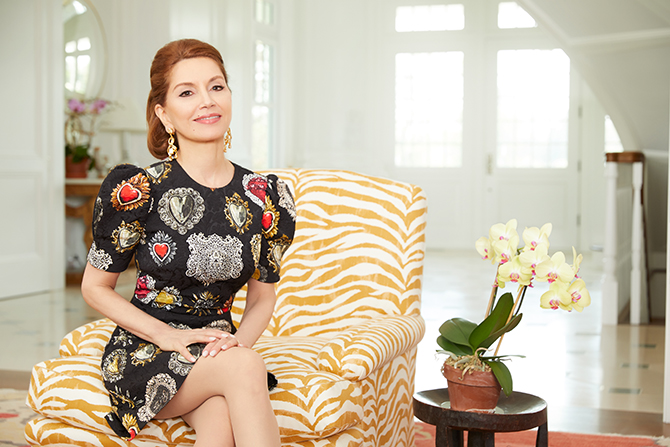 Dress by Dolce & Gabbana
Dress by Dolce & GabbanaBy Mari Pack
Photography by Michael Paniccia
Hair by La Carezza and Henry de la Paz for Warren Tricomi
Make-up by La Carezza and Kimara Ahnert
Philanthropy is not an exclusive club,” writes Jean Shafiroff in her book, Successful Philanthropy: How to Make a Life By What You Give (Hatherleigh Press). As a philanthropist, author, and public speaker who built her life around giving, Shafiroff insists that all of us, whether through volunteering our time or donating funds, possess the ability to uplift charitable causes.
However, she also believes that those with resources have a particular responsibility to give back. She’s actively involved as a volunteer fundraiser, donor, and leader for various charities, especially women’s and children’s organizations, animal rights charities and institutions dedicated to underserved populations.
Shafiroff is a board member for seven charities: New York City Mission Society, French Heritage Society, Couture Council (Museum of the Fashion Institute of Technology), The Jewish Board, Southampton Animal Shelter, Southampton Bath and Tennis Club Charitable Foundation, and Global Strays. She is also a New York Women’s Foundation board alumnus. She has been honored for her philanthropic work by the American Heart Association, New York City Mission Society, American Cancer Society, Surgeons of Hope, Jewish Board, and many others.
We sat down to talk with Shafiroff about her experience volunteering with The New York Women’s Foundation, as well as about women’s issues and global causes.
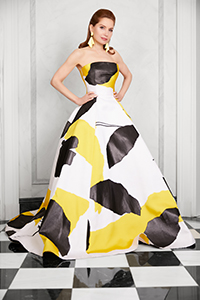 Dress by Oscar de la Renta
Dress by Oscar de la RentaWhy do you like working with New York charities?
I love the energy, vibrancy, and diversity of New York. It adds an exciting aspect to my life, and I want to be helpful to those who struggle here. We are all brothers and sisters. I’ve been a fortunate woman financially and educationally, and want to do my best to give back. Some people only want to give to their own, but in New York you have an opportunity to give to a diverse range of people. For instance, I’m a Catholic woman married to a Reform Jew, but still want to donate to causes that better the lives of immigrants, Muslims, and women of color.
We know that you’re very interested in women’s causes. How did you first become involved with The New York Women’s Foundation?
With this charity, a friend made the introduction. I was having lunch with a group of women about eight years ago when I suggested that we start a charity for women’s outreach. One of the women recommended that I look into The New York Women’s Foundation, which invests in organizations and leaders that strive for economic security, justice, safety, and health for women and families. She introduced me to the charity. At the time, Diana Taylor, Mayor Bloomberg’s partner, was the board president.
I met with the head of the foundation and liked what they were doing. I suggested that I, along with two other women, host a luncheon. We invited the leaders of three charities to speak at Le Cirque for about 50 people. The following year, as my involvement with New York Women’s increased, I decided to host a luncheon on my own for about 80 women. That year, Diana Taylor was our keynote speaker.
Since then, I’ve hosted luncheons for The New York Women’s Foundation. We’ve covered a number of topics, including prison reform. Last year, we had the chairman of the Independent Commission on New York City Criminal Justice and Incarceration Reform, Jonathan Lippman, speak. This month, I’m hosting a large cocktail party for New York Women’s in my home. I will also co-chair their gala in October, which I’ve done for several years.
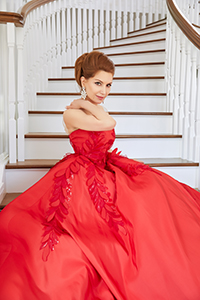 Dress by Oscar de la Renta
Dress by Oscar de la RentaWhich women’s issues are particularly close to your heart?
We have to elevate women out of poverty. Women need to have economic stability and the ability to support themselves. I’m involved with The New York Women’s Foundation because we address these issues. The real key is to end discrimination against women, women of color, and to create economic stability.
Why is the economic and personal empowerment of women important to you?
Poverty is such a terrible crutch. Many women haven’t had the same opportunities as men in New York or around the world. Less than 7 percent of foundation funding in the United States goes to women and girls, while 1 in 4 women and girls are living in poverty in New York City. As far as I’m concerned, there isn’t a rhyme or reason as to why one person is born with resources and another without. I could just as easily have been born into poverty, and I believe that those who have resources have an obligation to give.
Moreover, as a woman, I understand the needs of other women and want to be of help. Women must believe that we can do anything, and must be treated as the equals of our male counterparts. This means that women should have access to the same jobs and salaries. It’s good to see that women have more opportunities now than they once did.
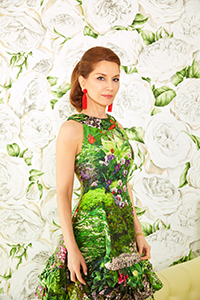 Dress by B. Michael America Couture
Dress by B. Michael America CoutureCan you talk about what it was like working as a woman on Wall Street?
Well, my first career was as a physical therapist because it allowed me to get a job. I grew up middle class and knew that I would have to make a living on my own. I graduated with a BS in physical therapy from Columbia University’s College of Physicians and Surgeons and worked as a physical therapist at St. Luke’s Hospital in New York City. Nevertheless, I went back to get an MBA from the Graduate School of Business at Columbia because I was inspired by all the people around me with advanced degrees, from the daughter of President Jimmy Carter’s Secretary of State, Amy Vance, to my then boyfriend who was an MD. I originally planned to use my MBA in conjunction with physical therapy to go into hospital finance.
Instead, I worked on Wall Street. Women have come a long way since those days, and I’m happy to see that. However, there’s still a lot of work to be done.
How can women advocate for each other in professional settings?
Rather than look to one another as competition, I think it’s essential for women to mentor other women. I never try to compare myself to someone who I can help nurture. Instead, women need to empower one another.
You were recently awarded the Daily Fashion Report’s Best Dressed in Ball Gowns. What is your relationship to fashion and how does the fashion industry help women?
I think that women have a right to express themselves through fashion. It’s a hobby of mine; just the way stamp collecting is a hobby to others. I respect those who don’t have an interest in fashion, but I happen to love it. I’m not afraid to wear my gowns more than once in the same season either. Like anyone else, I have a budget, and I wear them to enjoy them. I also respect the fashion industry because it is a massive employer of women as well as men. It affords people the opportunity to support themselves.
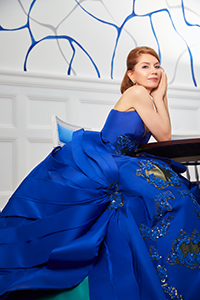 Dress by Victor dE Souza Couture
Dress by Victor dE Souza CoutureWe understand that charities around the world are also important to you. What do you see on the horizon for global philanthropy?
While philanthropy is ingrained in American culture, I hope that it will continue to grow globally. We need to improve the lives of those around the world. I have supported groups in developing nations during my travels to places like Nicaragua, Costa Rica, Saint Lucia, and Cambodia, where there is a great need for philanthropic efforts.
Moreover, young people, including women, should focus on their philanthropic interests. I would like to see them participate in global as well as local efforts. My daughter started a non-profit, Global Strays, which supports animal rescue groups with a focus on developing nations.
Any last words on New York City?
I love my city. If I had a choice to live elsewhere, I would still choose New York. This is home to me. There are so many positive things happening here for women as well as men, and I want to be a part of that.



